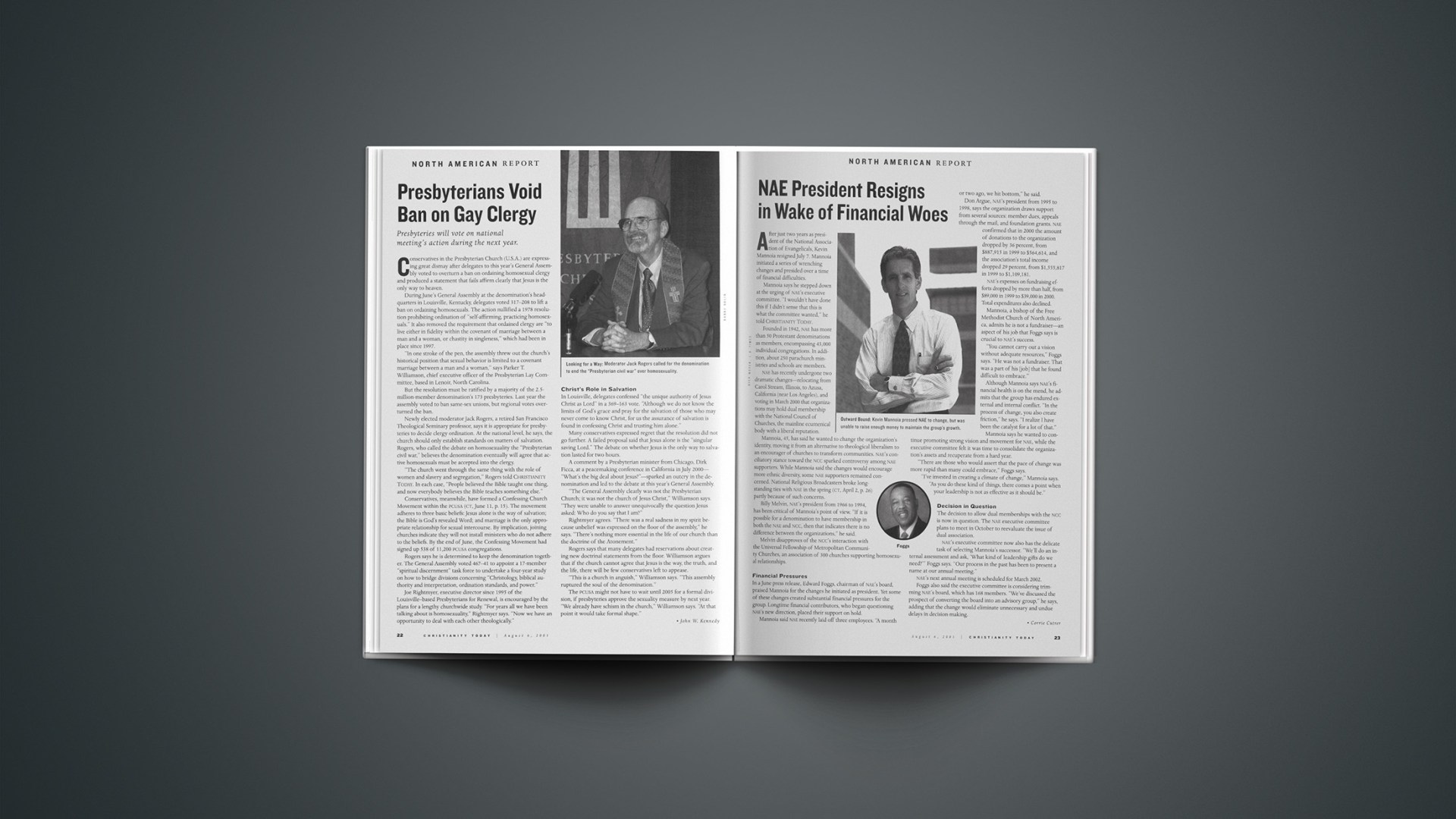During June’s General Assembly at the denomination’s headquarters in Louisville, Kentucky, delegates voted 317-208 to lift a ban on ordaining homosexuals. The action nullified a 1978 resolution prohibiting ordination of “self-affirming, practicing homosexuals.” It also removed the requirement that ordained clergy are “to live either in fidelity within the covenant of marriage between a man and a woman, or chastity in singleness,” which had been in place since 1997.
“In one stroke of the pen, the assembly threw out the church’s historical position that sexual behavior is limited to a covenant marriage between a man and a woman,” says Parker T. Williamson, chief executive officer of the Presbyterian Lay Committee, based in Lenoir, North Carolina.
But the resolution must be ratified by a majority of the 2.5-million-member denomination’s 173 presbyteries. Last year the assembly voted to ban same-sex unions, but regional votes overturned the ban.
Newly elected moderator Jack Rogers, a retired San Francisco Theological Seminary professor, says it is appropriate for presbyteries to decide clergy ordination. At the national level, he says, the church should only establish standards on matters of salvation. Rogers, who called the debate on homosexuality the “Presbyterian civil war,” believes the denomination eventually will agree that active homosexuals must be accepted into the clergy.
“The church went through the same thing with the role of women and slavery and segregation,” Rogers told Christianity Today. In each case, “People believed the Bible taught one thing, and now everybody believes the Bible teaches something else.”
Conservatives, meanwhile, have formed a Confessing Church Movement within the PCUSA (ct, June 11, p. 15). The movement adheres to three basic beliefs: Jesus alone is the way of salvation; the Bible is God’s revealed Word; and marriage is the only appropriate relationship for sexual intercourse. By implication, joining churches indicate they will not install ministers who do not adhere to the beliefs. By the end of June, the Confessing Movement had signed up 538 of 11,200 PCUSA congregations.
Rogers says he is determined to keep the denomination together. The General Assembly voted 467-41 to appoint a 17-member “spiritual discernment” task force to undertake a four-year study on how to bridge divisions concerning “Christology, biblical authority and interpretation, ordination standards, and power.”
Joe Rightmyer, executive director since 1995 of the Louisville-based Presbyterians for Renewal, is encouraged by the plans for a lengthy churchwide study. “For years all we have been talking about is homosexuality,” Rightmyer says. “Now we have an opportunity to deal with each other theologically.”
Christ’s Role in Salvation
In Louisville, delegates confessed “the unique authority of Jesus Christ as Lord” in a 369-163 vote. “Although we do not know the limits of God’s grace and pray for the salvation of those who may never come to know Christ, for us the assurance of salvation is found in confessing Christ and trusting him alone.”Many conservatives expressed regret that the resolution did not go further. A failed proposal said that Jesus alone is the “singular saving Lord.” The debate on whether Jesus is the only way to salvation lasted for two hours.
A comment by a Presbyterian minister from Chicago, Dirk Ficca, at a peacemaking conference in California in July 2000—”What’s the big deal about Jesus?”—sparked an outcry in the denomination and led to the debate at this year’s General Assembly.
“The General Assembly clearly was not the Presbyterian Church; it was not the church of Jesus Christ,” Williamson says. “They were unable to answer unequivocally the question Jesus asked: Who do you say that I am?”
Rightmyer agrees. “There was a real sadness in my spirit because unbelief was expressed on the floor of the assembly,” he says. “There’s nothing more essential in the life of our church than the doctrine of the Atonement.”
Rogers says that many delegates had reservations about creating new doctrinal statements from the floor. Williamson argues that if the church cannot agree that Jesus is the way, the truth, and the life, there will be few conservatives left to appease.
“This is a church in anguish,” Williamson says. “This assembly ruptured the soul of the denomination.”
The PCUSA might not have to wait until 2005 for a formal division, if presbyteries approve the sexuality measure by next year. “We already have schism in the church,” Williamson says. “At that point it would take formal shape.”
Copyright © 2001 Christianity Today. Click for reprint information.
Related Elsewhere
The PCUSA‘s site for the 213th General Assembly had daily reports and photos.Christianity Today’sWeblog examined the PCUSA General Assembly’s decisions.
Media coverage of the vote for homosexual clergy included The Washington Post, The Dallas Morning News, The Chicago Tribune, and Louisville’s Courier Journal.
Coverage of the debate over Jesus as the only savior ran in The Dallas Morning News and Courier Journal.
Presbyweb offers extensive links and posts Ficca’s exact comments from July 2000 that led to “The Jesus Debate.”
Previous related Christianity Today articles include:
Presbyterians Vote Down Ban on Same-Sex Unions | Opponents say vague wording led to defeat. (March 29, 2001)
Presbyterians Propose Ban on Same-Sex Ceremonies | Change to church constitution, which passes by only 17 votes, now goes to presbyteries. (July 5, 2000)
Presbyterians urged to allow liberals to leave over homosexual ordination | “Irreconcilable” differences exist in the Presbyterian Church (USA) over the ordination of gay clergy. (February 28, 2000)
Presbyterians Support Same-Sex Unions | Northeast Synod rules 8-2 in favor of continuing church’s “holy union” ceremonies (January 10, 2000)
Homosexual’s Election Upheld | First Presbyterian Church of Stamford (Conn.) did not violate church law by electing an openly homosexual man to governing board. (August 16, 1999)
Presbyterians in Stalemate over Homosexual Ordination (August 10, 1998)










